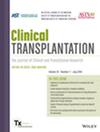Impact of Donor and Recipient Sex-Mismatch in Donation After Circulatory Death Heart Transplant
Abstract
Background
Prior studies have demonstrated an association between donor/recipient sex mismatch and worse outcomes in donation after brain death (DBD) heart transplant. This study aims to determine the impact of donor/recipient sex mismatch on outcomes in donation after circulatory death (DCD) transplant.
Methods
The study cohort consisted of 1260 patients from the United Network for Organ Sharing (UNOS) dataset who underwent DCD heart transplant between 12/2019 and 12/2023. Transplants were stratified into four groups: female donor/female recipient (FD/FR), female donor/male recipient (FD/MR), male donor/male recipient (MD/MR), and male donor/female recipient (MD/FR). The primary outcomes were acute rejection and post-operative complications, while the secondary outcome was mortality. Multivariable logistic regression was used to analyze factors associated with rejection, while Kaplan–Meier (KM) survival analyses were compared using the log-rank test with post-hoc binary comparisons.
Results
Female recipients who received DCD transplant had higher rates of acute rejection compared to male recipients (FD/FR: 26 (20%), MD/FR: 28 (22.2%), MD/MR 110 (11.8%), FD/MR 6 (9%), p = 0.001) while rates of stroke, dialysis, and pacemaker implantation were similar. Among male recipients, weight, height, and left ventricular assist device (LVAD) were associated with acute rejection. However, neither weight nor height was associated with acute rejection in female recipients. The KM curve showed no difference in long-term mortality.
Conclusions
Female recipients who receive DCD hearts from male and female donors have an increased risk of acute rejection compared to their male counterparts. Height and weight are associated with acute rejection in male patients. Male and female recipients have similar long-term mortality.

 求助内容:
求助内容: 应助结果提醒方式:
应助结果提醒方式:


